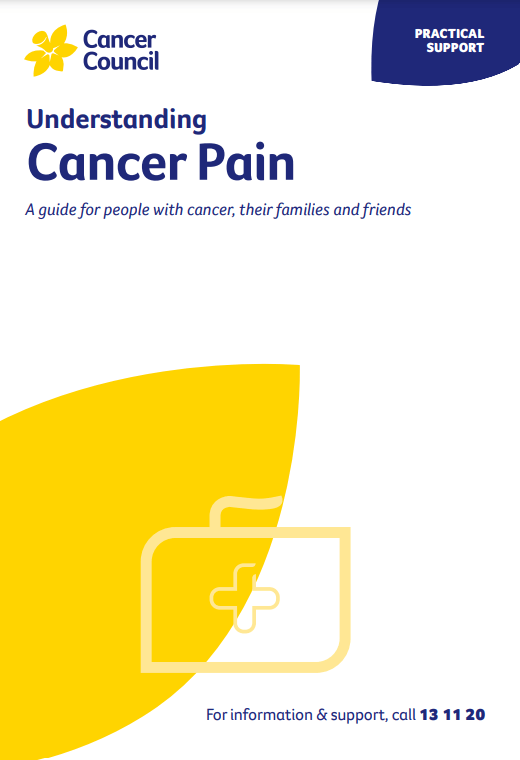Many people with cancer worry about spending their final days in pain, but not everyone has pain. For some, pain comes and goes. The health professionals caring for you won’t let you suffer with unrelieved pain, and will help you to manage it as much as possible. Palliative care specialists are especially experienced in managing pain. It’s important not to just “put up with” pain and assume it’s normal. Controlling pain lets you continue activities for longer and offers a better quality of life.
Finding the right pain relief
Pain is managed depending on the type and intensity, and it may take time to find what works best for you.
Complementary therapies, such as massage or meditation, may be used alongside prescribed treatments. A combination of pain medicines, some of which work in other conditions, is often used. You may be offered:
- mild pain medicine, such as paracetamol and non-steroidal anti-inflammatory drugs (NSAIDs)
- strong pain medicine such as morphine, oxycodone, fentanyl and hydromorphone.
You may also be given other types of medicine along with the main pain medicine. These could include:
- antidepressant and anticonvulsant medicines for nerve pain
- local anaesthetics for severe nerve pain
- anti-anxiety medicines for muscle spasms
- a nerve block or epidural (for pain that is difficult to manage).
Sometimes pain medicine can be given as a continuous infusion, where a small cannula is inserted under the skin and the medicine delivered slowly by a pump. Most options can be organised to have at home.
For more on this, see Pain and cancer, and listen to our podcast on Managing Cancer Pain and the podcast below.
Podcast: Managing Pain when Cancer Is Advanced
Listen to more episodes from our podcast for people affected by cancer
Prof Jane Phillips, Head, School of Nursing and Professor, Centre for Healthcare Transformation, Queensland University of Technology and Emerita Professor Palliative Nursing, University of Technology Sydney, NSW; Prof Meera Agar, Palliative Care Physician, Professor of Palliative Medicine, University of Technology Sydney, IMPACCT, Sydney, NSW; Sandra Anderson, Consumer; A/Prof Megan Best, The University of Notre Dame Australia and The University of Sydney, NSW; Prof Lauren Breen, Psychologist and Discipline Lead, Psychology, Curtin University, WA; David Dawes, Manager, Spiritual Care Department, Peter MacCallum Cancer Centre, VIC; Rob Ferguson, Consumer; Gabrielle Gawne-Kelnar, Counsellor, Psychotherapist and Social Worker, One Life Counselling & Psychotherapy, NSW; Justine Hatton, Senior Social Worker, Southern Adelaide Palliative Services, Flinders Medical Centre, SA; Caitlin MacDonagh, Clinical Nurse Consultant, Palliative Care, Royal North Shore Hospital, Northern Sydney Local Health District, NSW; McCabe Centre for Law and Cancer; Palliative Care Australia; Belinda Reinhold, Acting Lead Palliative Care, Cancer Council QLD; Xanthe Sansome, National Program Director, Advance Care Planning Australia; Kirsty Trebilcock, 13 11 20 Consultant, Cancer Council SA.
View the Cancer Council NSW editorial policy.
View all publications or call 13 11 20 for free printed copies.
Need to talk?
Support services
Caring for someone with cancer
Speak to a health professional or to someone who has been there, or find a support group or forum
Cancer Council Online Community
A community forum – a safe place to share stories, get tips and connect with people who understand
Cancer information
Advanced cancer
Information for all stages of advanced cancer, from the initial diagnosis to palliative care and grief
Managing cancer side effects
Strategies for coping with some of the physical issues that can occur with cancer
